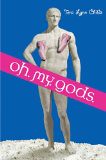 The Science of Monsters: The Origins of the Creatures We Love to Fear Matt Kaplan
The Science of Monsters: The Origins of the Creatures We Love to Fear Matt KaplanKaplan looks at many mythical monsters and what was going on in the world that people explained with monsters. He then looks at how the roles of the particular monster have changed over the years as our understanding and world has changed. I think it's at it's strongest when talking about the scientific explanation for things that we understand now, but back then Occam's Razor really did logically lead to "vampire." I also found the exploration of the role such creatures play today in our collective psyche (and how it has changed over time) to be interesting--especially when he looks at what we most fear today, and what's going on in our world that makes us fear those things instead of others. (Although, see below, I do have a few complaints about this section.)
Kaplan writes for the Economist, and much of this book has that same tone of sarcastic snark, which is something I personally love but may be a major turn-off for some readers. It's an adult book, but it's written in a very accessible, readable style (again, think Economist) and I think many teens would enjoy it.
My main complaint is when he’s looking at Greek monsters today, he obviously uses a lot of Percy Jackson, but… he uses the movie, not the books. I’m not even sure he’s aware that they are books. *headdesk* *headdesk* *headdesk* He does the same thing with Harry Potter, but we at least mentions the books. When it comes to adult stuff (such as Jurassic Park) he’ll actually talk about the differences between books and movie.
But, I did learn a lot and it was very readable and interesting. It’s mostly European-centric, but he does pull in non-European cultures and monsters occasionally. He does a great job at looking how sometimes different cultures have different monsters that look similar but are very different-- often one sees it as evil, one sees it as an overall benevolent force.
It’s a great look at how humans use monsters to explain what we don’t understand and also as a way to name our fears.
Book Provided by... my local library
Links to Amazon are an affiliate link. You can help support Biblio File by purchasing any item (not just the one linked to!) through these links. Read my full disclosure statement.

















